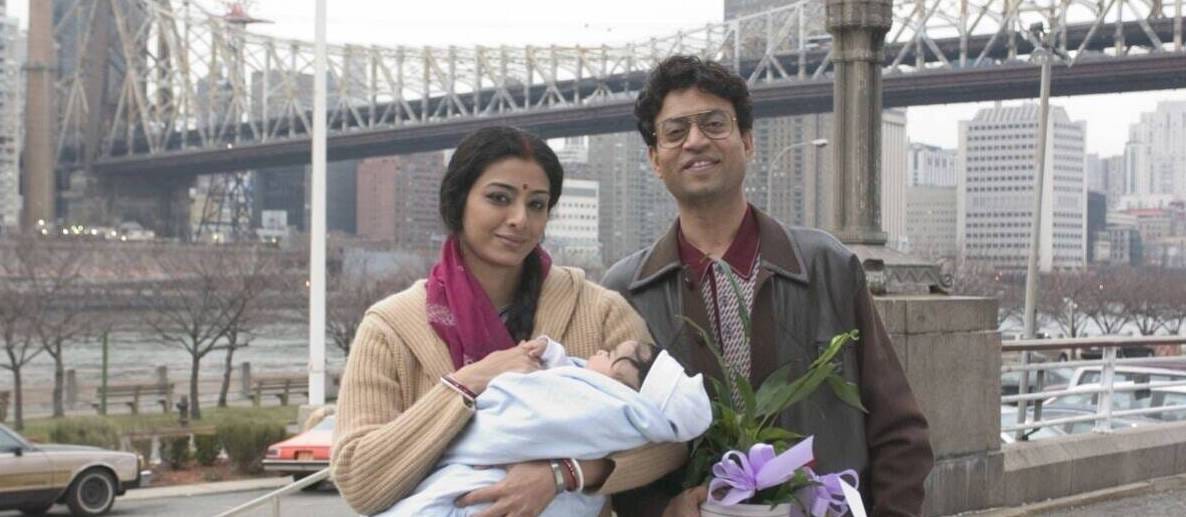The Namesake
What's in a Name?
We wouldn’t be celebrating AAPI month properly if we didn’t look to India, one of the world’s greatest film producers, for an entry in the Movie Night canon. This will be (probably) the only film this month where a significant casting decision was made based on the director’s children being enormous fans of Harold & Kumar Go to White Castle. Speaking of Kal Penn, don’t be fooled by Penn’s filmography; Here, he matches the strength and tone of his fellow cast members effortlessly. It was a surprise and a pleasure to see him carry much of the film. (No offense to any fans of Van Wilder, Epic Movie, Son of the Mask, The Layover, or Bachelor Party Vegas.)
We are on a long ride on an old train with only a book by Nikolai Gogol to pass the time. A conversation between a young man and an older man transpires. The two men whose lives are on two different tracks share differing philosophies. Then the train derails.
Most movies warp, contract, or expand time to serve the needs of the plot. There’s nothing wrong with this, but this is not the case here. The Namesake deploys steady pacing to sow an understanding, at times a terrifying understanding, of time and its relentless march. The deliberate flow of time in the film provides the backbone for a story of Indian immigrants who move to America so that their children might have a chance to be “whatever they want to be.” The story may sound familiar, but it’s rare to find a film as grounded in reality, buoyed by emotion, driven by principles, and all while even-handedly covering the span of multiple generations. It’s worth noting that the film is directed by a woman (Mira Nair), written by a woman (Sooni Taraporevala), and based on a novel written by a Pulitzer Prize-winning woman. (Jhumpa Lahiri)
The story begins in Calcutta in 1977 and takes us to the present day. A montage introduces the city's social fabric: bustling streets, busy ports, and families shopping for groceries and running errands. We’re introduced to the late, great Irrfan Khan as Ashoke Ganguli. Irrfan is at the height of his subtle power. Ashoke is arranged to be married to Ashima (Tabu). Following their wedding, they move from Calcutta to the suburbs of New York City, where Ashoke is employed.
Ashima and Ashoke have children, and their world changes again. There is less time for leisure, singing, and dinners. We watch as their children, Gogol (Kal Penn) and Sonali (Sahira Nair), grow older and as a chasm develops between the parents and their ‘American’ children. Children who are forming their own identities and beliefs based on where they are growing up: the US. We live in a country that is increasingly unwelcome to immigrants: people who uproot their lives and leave their home soil and families so that they may find a better future for themselves and their loved ones. The Namesake is a slow-burning reminder of the innate humanity that we all possess, despite the machinations of an inhospitable system attempting to take that humanity apart and make it conform.
The screenplay is rich in detail about how maintaining one’s sense of identity and culture must be clung to in a foreign place. In one powerful scene, a white character is centering themselves in the face of a Ganguli family tragedy. Gogol aptly points out: “This is not about you.” In another scene, Gogol is wrestling with the implication of his name. To Gogol, his name is a burden, a reminder of the past. To his family, the name Gogol is a unique blessing and, ironically, also a reminder of the past. Being reminded of the past can have a different effect depending on where you are in your life.
The Namesake is like training wheels for empathizing with “outsiders” and understanding what immigrants may go through in adjusting to America. Most movies aim to offer us some kind of insight, but The Namesake hits you right in the heart with the details: How do you navigate the trains? How do you do the laundry? It’s illegal to name our son the way we wish? This culture shock is profoundly felt due to restrained performances from Irrfan and Tabu. Emotions may not always be fully on display, but we sense them under the surface. The parents maintain their poise and dignity as a foreign country seems intent on stripping them of their identity.
What’s in a name? This is the question at work in this story of generations. A name can represent the past or symbolize hope for the future. It can carry a meaning that you wish for your offspring to embody. You can choose to keep your name out of pride or remembrance, or you can choose to adopt a new one with an eye on the future. Movies, at their best, can awaken curiosity in us and a desire to learn more about the world and cultures around us. Gogol asks his father why he was given such an obscure name. Ashoke thinks for a moment and, smiling, says, “We all came out of Gogol’s Overcoat. One day you’ll understand.” I believe the curious among us will understand as well.
The Namesake
Written by Sooni Taraporevala and Jhumpa Lahiri; Directed by Mira Nair
2006
122 minutes
English, Bengali/Bangla

